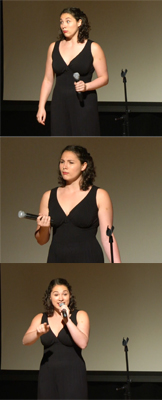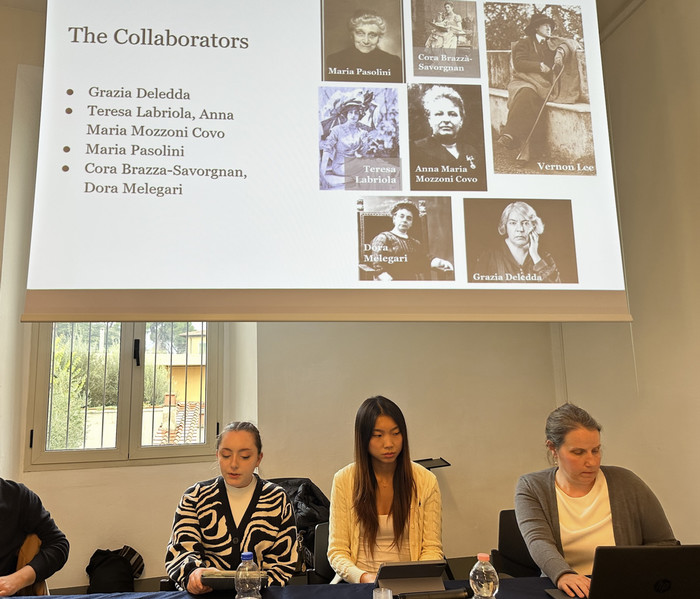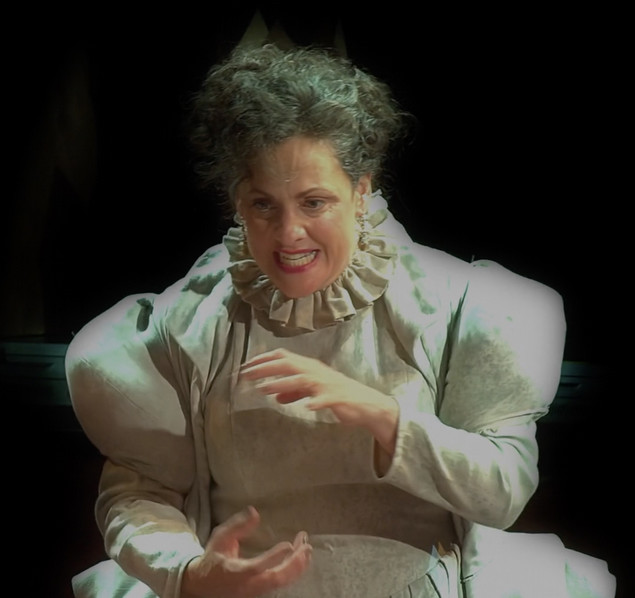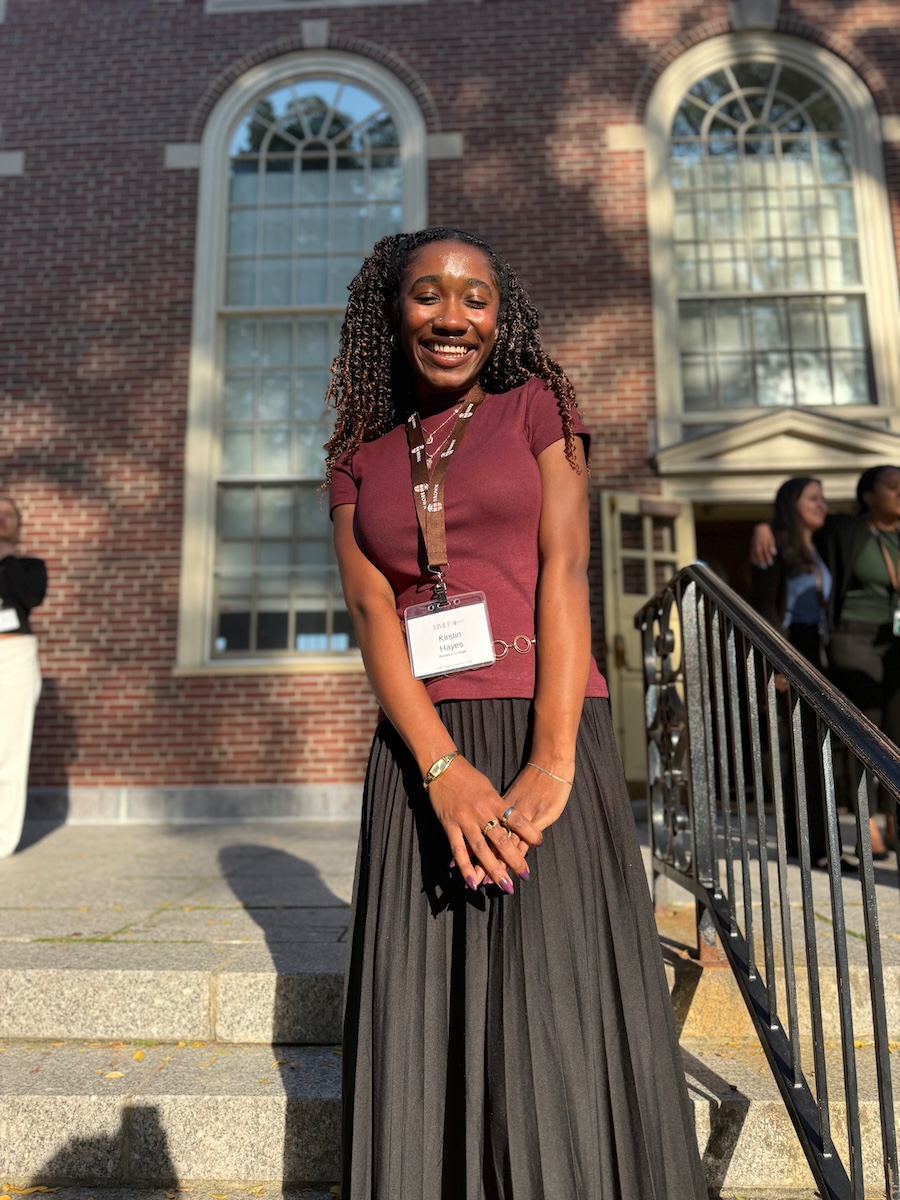Sophie de Bruijn ’18 Jokes Her Way to an Honor’s Project on Comedy and Politics
By Rebecca Goldfine
Sophie de Bruijn is funny, and at some point she started taking that seriously: performing comedy for audiences rather than just spontaneously amusing family and friends. But this summer she is taking comedy seriously in a new way. In preparation for her senior thesis she is researching the way comedy can subvert power.
The rising senior has a Micoleau Family Fellowship in the Creative and Performing Arts from Bowdoin to begin investigating the relationship between comedy and politics for her upcoming yearlong honor’s project. She plans on writing a thesis paper and also developing a one-woman show.
To lay the groundwork for this undertaking, she is reading everything from ancient Greek and Roman texts to modern gender theory. “As far as form goes, the first-ever comedy was political comedy, making fun of people in positions of power,” she said, explaining her book list, which includes Aristophanes and Aristotle. “That has always been the crux of what comedy is.”
An English and theater major and a gender and women’s studies minor, de Bruijn is particularly interested in female comedians. Despite there being a coterie of successful comedic women working in showbiz these days (e.g., Tiny Fey, Amy Schumer, Kate McKinnon), de Bruijn said the myth that men are funnier than women has not dissipated.
That myth, she argues, is one perpetuated by those who benefit from traditional social hierarchies. “The single best way of attacking power structures that have disenfranchised women and people of color is comedy, so why would the people who have benefited from those power structures willingly have them dismantled?” de Bruijn pointed out. Women’s comedy, by eroding this gendered power structure, can bring the power of humor to bear on this oldest of hierarchies.
In some ways, it does seem as if more women are emboldened to try their hand at comedy, including at Bowdoin. This spring Callye Bolster ’19 launched an all-female comedy group on campus. A Shakespeare spoof written and performed by Maggie Seymour ’16 and Olivia Atwood ’17, which they developed while students at Bowdoin, is earning glowing reviews in its current run in New York City.
De Bruijn said her honor’s thesis will look at questions such as how marginal identity markers — like race, gender, sexuality, and ethnicity — get performed on stage; who gets to make fun of who and what, where and when; and any differences, if they exist, between women’s comedy (where women are the target audience) and feminist comedy, which is any comedy that “makes a critique of, lampoons, or subverts patriarchal, hegemonic power structures,” according to de Bruijn.
And while she’s quick to note that her project is still early in the planning stage, she is considering writing a senior show based on a made-up character she describes as “a feminist performance artist, an ultra-alternative theater type.” This woman would be a conglomeration of all the personalities she’s met growing up as a theater kid and at the Stella Adler Studio of Acting in New York City, where she did a 10-week conservatory program last summer. “My idea is to parody that character through the show. The show itself would be presented as this character’s latest work,” she said.
In doing this, she will of course try to be funny, but she’ll also be critiquing her own relationship to “white feminism and white liberalism.” She said there’s something “ripe for parody” about a white woman from Connecticut (de Bruijn grew up in Westport, Conn.) who thinks she can be the “voice of third-wave intersectional feminism.”
While it might strike a few people outside of the comedy world as a bit incongruous to combine serious academic research with putting on a funny and entertaining show, as de Bruijn is planning to do, she said the two pursuits actually go well together.
Besides reading a lot of history and theory, she’s been watching three to four hours of comedy a day, all the while writing her own material. “I’ve always been into comedy and watched comedy but didn’t have the historical grounding or context that I’m getting now, and that has been interesting and super helpful for me as a performer,” she said.
“It is a science, and the more you do it, the more you’re able to knock down what that formula is that makes it work,” she said. “Before you see a joke told, it has probably been told 200 times and has gone through 200 iterations. There’s been a 20-word version, an 18-word version, a 15-word version. You have to get the writing done perfectly, figure out which timing works, which vocal inflection, what posture to have, what movements you’re doing.”
Indeed, she’s analyzing comedy so minutely, she says it’s hard to make her laugh much these days. Still, she does continue to get a kick out of her own mishaps. She recounted a story in which, for the second time in her life, a random man has recently followed her down a city street, ripping pieces of bread from a loaf to throw at her. Yes, weird, and definitely creepy. Also — good material.
“I think, ‘Oh great, this is amazing, this is a gold mine,” she said. “So, what, you’re not going to give me a side of olive oil and vinegar, too?” she riffed, before adding: “That is the only way I know how to see the world. Every obstacle or hardship you have, you know you have a way of spinning it that is going to make other people laugh. Which is a very special thing.”



